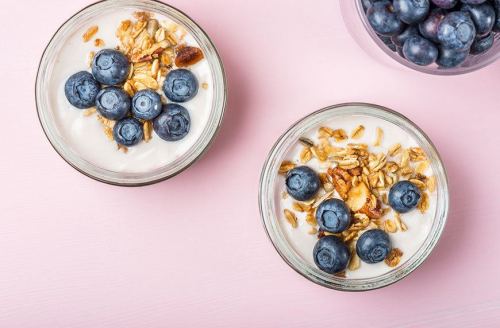Those wrapping up a Sober October or Dry January may have noticed some significant changes to their overall health. When you stop drinking, a few things can potentially happen: your skin could get clearer, your sleep quality could improve, and your energy levels could begin to increase. However, one of the most prevalent (positive) symptoms of ditching the booze is a potential improvements in your digestion. In fact, according to Niket Sonpal, MD, a New York-based internist and gastroenterologist, the connection between alcohol and gut health is extremely strong. Ahead the gut health expert delves deeper into the correlation between the two, and what exactly happens in your microbiome when you quit drinking.
How does alcohol affect the gut microbiome?
According to Sonpal, there’s no denying that drinking alcohol won’t necessarily do your gut microbiome any favors. “As much fun as alcohol may be, it does have its share of negative health effects, especially for the stomach and the esophagus,” says Dr. Sonpal. Large quantities of alcohol can cause diarrhea, and lead to gastritis, or stomach inflammation, which causes heartburn, acid reflux, and sometimes long-term esophageal damage. Additionally, booze contains ethanol which can also increase gut movement, ultimately speeding up digestion without giving your gut a chance to absorb water, increasing the chances of experiencing diarrhea.
How does alcohol contribute to leaky gut?
Alcohol takes a long journey through the body as it’s processed. “Once it leaves the stomach and it gets metabolized, it hits the small intestine,” Dr. Sonpal says. From there, he says that alcohol can damage the lining known as the villi, making it harder for you to absorb certain nutrients. This damage to the lining can also potentially have more serious consequences, including a leaky gut. According to Harvard Medical School, “an unhealthy gut lining may have large cracks or holes, allowing partially digested food, toxins, and bugs to penetrate the tissues beneath it.”
In turn, this damage can potentially trigger inflammation and alter its composition, causing a gut flora imbalance (normal bacteria) that could lead to problems within the digestive tract and beyond. Otherwise, a strong and healthy gut lining creates a barrier that controls what gets absorbed into the bloodstream safely. Dr. Sonpal reiterates that any disharmony in the gut can potentially kill off both good and bad bacteria, destabilizing the microbiome altogether. “The bad bacteria tend to grow more and so we ended up getting a mismatch of the microbiome as well,” he says.
How does chronic alcohol use influence digestive issues?
In addition to an alcohol-induced leaky gut and diarrhea, alcohol consumption can also lead to dehydration. “When you’re drinking alcohol at night, you’re less likely to be drinking water and other hydrating beverages. Alcohol also stops the body from releasing antidiuretic hormone, which leads to more water loss than usual and helps to explain your increased need to urinate during the night,” registered dietitian Trista Best, MPH, RD, LD, previously shared with Well+Good. In fact, dehydration is one of the leading causes linked to constipation. Research shows that even mild dehydration can lead to constipation.
The science: When you’re dehydrated your body will absorb any water or fluids from foods as it makes its way through the digestive tract. But if you’re well-hydrated, your body won’t need to absorb too much liquid from the food. In turn, this can impact how soft (or hard) your stool will be. When in doubt, you can always refer to a stool chart to help you determine what the texture of your poops may be trying to tell you about your overall health.
It’s also worth noting that in addition to alcohol’s impact on gut health, research shows that alcohol increases heart rate, too. “Moderate to heavy drinking over an extended period of time may increase the risk of a dangerous type of irregular heartbeat in adults over 40 years of age,” cardiologist Suzanne Steinbaum, MD, DO, medical expert for American Heart Association’s Go Red for Women movement, previously shared with Well+Good. Fortunately, all of these issues can be reversed by setting aside that glass of wine for a while.
How do I protect my gut when drinking alcohol?
Ultimately, the best case scenario for your gut (and your overall health) is to minimize the consumption of alcohol as much as possible. That said, the gastroenterologist says it won’t be all doom and gloom if you sip on a drink here and there. “The stomach is a resilient organ that bounces back pretty quickly,” Dr. Sonpal says. On that note, he says once alcohol is eliminated symptoms of gastritis should begin to heal and improve within just a few weeks. That said, it’s important to keep in mind that alcohol prevents the healing of ulcers, and if you have one, it’s important to eliminate alcohol consumption altogether.
Similar to the stomach, Dr. Sonpal says the GI tract can also recuperate eventually from drinking alcohol, at least in most cases. “In a few weeks to months, the villi of the small intestine should improve,” he says. To speed up the healing process, Dr. Sonpal recommends a few weeks of supplementation with pre- and probiotics, to help your gut microbiome bounce back. Of course, if you believe you’re dealing with a more serious gastrointestinal issue, it’s always best to consult your primary physician to assess the health condition.
What should you drink instead of alcohol?
Much to our relief, if you replace your alcohol consumption with anti-inflammatory drink alternatives, like a turmeric ginger green smoothie or a golden milk latte, you should start to see the benefits in just a few short weeks, says Dr. Sonpal. However, keep in mind that you shouldn’t swap alcohol for another potentially damaging or inflammation-causing drink either. Think sugar-laden drinks or sodas. Consequently, the gastroenterologist says you simply can’t go wrong with upping your daily intake of plain ol’ water.
In addition to H2O, Dr. Sonpal also recommends plain fruit juices made without added sugars. However, both of these drinks should also be paired with a nutrient-dense diet to fully reap the benefits of eliminating alcohol consumption. “When you stop drinking alcohol, we naturally start consuming other liquids, like water and fruit juices, and we end up eating more fiber,” Dr. Sonpal says. “And what ends up happening is our colon gets healthier as well.” A win-win situation.
What happens if I drink alcohol again?
So, what happens if you take this reset and restore gut health, only to resume alcohol consumption later on? If you want to maintain the benefits, Dr. Sonpal says you’ll need to figure out what moderation looks like for you. “Each person has sort of their own barometer. I know that if I have a couple of drinks in a night, I’m okay. But more than two, my heartburn starts acting up,” he says. “It all depends on each individual patient and each individual person’s threshold. It also depends on what type of alcohol. For some people, hard alcohol tends to cause more difficulties than non-hard alcohol, like wines and beers. It’s hard to say.” In any case, moderation, like most things in life, is the name of the game, he says.
Foods to help you poop, according to a dietitian:
Sign Up for Our Daily Newsletter
Get all the latest in wellness, trends, food, fitness, beauty, and more delivered right to your inbox.
Got it, you've been added to our email list.











